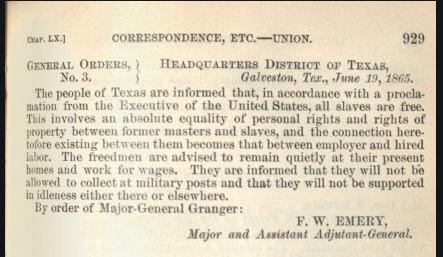“The Freedman are advised to remain quietly at their present houses and work for wages. They are informed that they will not be allowed to collect at military posts and they will not be supported in idleness either there or elsewhere.”- Final lines of the Juneteenth Proclamation
Don’t get it twisted, Juneteenth did not “free” us. Neither did the Emancipation Proclamation, or the constitutional amendments that were supposed to offer us “equal protection.” This freedom was little more than wage slavery, as Black folks were “freed” but told to stay in their “houses” aka slave quarters, and work for “wages” which tended to barely amount to room and board. And note the admonition “to remain quietly” in this position and how “idleness” won’t be supported.

Freedom, then as now is never given by the oppressor it is seized by the oppressed with ever shifting front lines established through continuing struggle and resistance. Being left, penniless, and homeless, and begging back to your prior master for maybe a slightly improved version of the old deal is not freedom.
So why didn’t folks just leave? Because they couldn’t, slavery emerged under other names, and indeed slavery then and even now is not even outlawed. Don’t believe me – here’s the 13th amendment passed after the Civil War
Section 1. Neither slavery nor involuntary servitude, except as a punishment for crime whereof the party shall have been duly convicted,
Chief among those “crimes” was “vagrancy” which basically meant being out in the open and Black without a White protector/owner, the so called Black Codes were passed in Southern states to basically reintroduce slavery.
An Act to confer Civil Rights on Freedmen
“Mississippi was the first state to pass such codes, with an 1865 law titled “An Act to confer Civil Rights on Freedmen”.[97] The Mississippi law required black workers to contract with white farmers by January 1 of each year or face punishment for vagrancy.[95] Blacks could be sentenced to forced labor for crimes including petty theft, using obscene language, or selling cotton after sunset.[98] States passed new, strict vagrancy laws that were selectively enforced against blacks without white protectors.[95][99] The labor of these convicts was then sold to farms, factories, lumber camps, quarries, and mines.[100]
After its ratification of the Thirteenth Amendment in November 1865, the South Carolina legislature immediately began to legislate Black Codes.[101] The Black Codes created a separate set of laws, punishments, and acceptable behaviors for anyone with more than one black great-grandparent. Under these Codes, Blacks could only work as farmers or servants and had few Constitutional rights.[102] Restrictions on black land ownership threatened to make economic subservience permanent.[36]
Some states mandated indefinitely long periods of child “apprenticeship”.[103] Some laws did not target blacks specifically, but instead affected farm workers, most of whom were black. At the same time, many states passed laws to actively prevent blacks from acquiring property.[104]“
Before the Juneteenth proclamation Texas’s freedmen “emancipation, the Southern states were already conspiring to re-enslave them, and doing so successfully. That does not sound much like “freedom” to me.
As W. E. B. Du Bois wrote in 1935:
“Slavery was not abolished even after the Thirteenth Amendment. There were four million freedmen and most of them on the same plantation, doing the same work they did before emancipation, except as their work had been interrupted and changed by the upheaval of war. Moreover, they were getting about the same wages and apparently were going to be subject to slave codes modified only in name. There were among them thousands of fugitives in the camps of the soldiers or on the streets of the cities, homeless, sick, and impoverished. They had been freed practically with no land nor money, and, save in exceptional cases, without legal status, and without protection”
And we are still fighting for freedom. From the basic recognition the “Black lives matter.” To an ongoing slave labor system in the prisons. My brother was paid 20 cents an hour to work outside under the scorching sun of Beaumont Texas, a 15 minute phone call cost 6 dollars I believe. You had to work a week to be able to have a 15 minute phone call with family. And you lost all privileges if you didn’t work. To a system that wants to consciously forget our past, and whitewash it from the pages of history books. Not that the system teaches our babies to read anyways. 18% of Black kids in Oakland unified read on grade level and 72% of White students do.
Check the numbers where you live.
Malcolm said the greatest weapon in the hands of the oppressor is the minds of the oppressed. And they have been expert at dulling our minds and twisting them.
During “freedom” Blacks were offered a “sharecropper’s education” enough to work in the fields but nothing more. And that is still what most of our babies get today. They aren’t taught to master literacy or numeracy, and without those skills or a trust fund they have two major options, modern low wage sharecropping or slavery from conviction of a crime.
So, I am down for Juneteenth, I love the holiday, but don’t get it twisted, and don’t let them whitewash it into a celebration of Freedom. It is a celebration of struggle and that we are still here and still strong and still fighting. That some small number of us have survived and some have even relatively thrived. But most of all, we are still here.
But as a people we still aren’t free.
You can read the entire proclamation here, and yes, I will be enjoying myself with some libations and BBQ on Juneteenth.
“The people of Texas are informed that, in accordance with a proclamation from the Executive of the United States, all slaves are free. This involves an absolute equality of personal rights and rights of property between former masters and slaves, and the connection heretofore existing between them becomes that between employer and hired labor. The freedmen are advised to remain quietly at their present homes and work for wages. They are informed that they will not be allowed to collect at military posts and that they will not be supported in idleness either there or elsewhere.”

